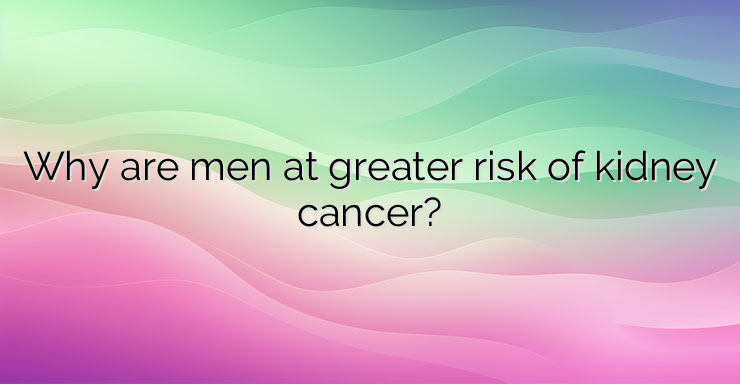Kidney cancer is one of the most common types of cancer and affects men more often than women. Kidney cancer tends to be more aggressive in men and often has a worse prognosis than kidney cancer in women. Smoking, hypertension and obesity are among the known risk factors for kidney cancer. Smoking and hypertension are more common in men than in women, which may partly explain the difference in kidney cancer rates. What are the risk factors for kidney cancer in men? Research has found important risk factors for the development of kidney cancer. The following risk factors contribute to kidney cancer in men: Cigarette smoking; Obesity; High blood pressure; Family history (case in the family) of kidney cancer; Certain medications, such as acetaminophen; Advanced kidney disease; Genetic and hereditary risk factors Certain hereditary syndromes can also increase the likelihood of developing kidney cancer. These include trusted source: Von Hippel-Lindau Syndrome (VHL); Birt-Hogg-Dub? syndrome (Birt-Hogg-Dub?); Hereditary leiomyomatosis and renal cell carcinoma; Hereditary Papillary Renal Cell Carcinoma Syndrome Why is kidney cancer more common in men? Studies show that men are twice as likely as women to develop kidney cancer, although the reasons for this difference remain unclear. Female sex hormones One partial explanation is that female hormones, such as estrogen, may play a protective role in helping to prevent kidney cancer. Estrogen levels decline with age in women, which may explain why their age at diagnosis of kidney cancer is usually older than the age at which men are diagnosed. Also, women who have had a hysterectomy have lower estrogen levels and may be at increased risk of developing kidney cancer. Smoking There is evidence that smoking cigarettes can increase the likelihood of developing kidney cancer. Estimates show that smoking is responsible for about 6% of kidney cancer deaths in developed countries. Because men are more likely to smoke tobacco than women, this difference may partly explain the higher incidence of kidney cancer among men. Genetic differences Genetic differences between men and women may also explain differences in the genetic mutations that cause kidney cancer. Various studies have discussed the difference in the environment in which the tumor develops between men and women. This affects the behavior of cancer cells and how they respond to treatment. Men may also experience a different immune response, making kidney cancer more aggressive.Hypertension Hypertension, or high blood pressure, is a known risk factor for developing kidney cancer and kidney disease and is more common in men than women. In addition, men with hypertension were 1.32 times more likely to develop kidney cancer. Hypertension also has an indirect link with kidney cancer. First, hypertension medications can increase the risk of kidney cancer. Second, hypertension is a risk factor for kidney disease, and impaired kidney function can increase the risk of kidney cancer. Obesity Although obesity is a risk factor for kidney cancer in both sexes, the risks are slightly higher in women than in men. What is the treatment for kidney cancer in men? There are different methods of treating kidney cancer. Doctors may use a single treatment or a combination of treatments, depending on several factors. Treatment options for kidney cancer include: Partial nephrectomy, in which surgery removes the tumor from the kidney; Simple nephrectomy, which involves removal of an entire kidney; Radical (total) nephrectomy, in which the surgeon removes the kidney, surrounding tissue and lymph nodes, and the adrenal gland; Radiotherapy; Chemotherapy; Immunotherapy There is evidence that men are at increased risk of complications from nephrectomy. However, men may respond better to other treatments, such as tyrosine kinase inhibitors and immune checkpoint inhibitors. References: 1. Centers for Disease Control and Prevention (CDC). Kidney cancer 2. National Center for Biotechnology Information (NCBI). Pandey, J., et al. (2021). Renal cancer 3. American Cancer Society. Renal cell cancer treatment (PDQ) � patient versionthat men are at increased risk of nephrectomy complications. However, men may respond better to other treatments, such as tyrosine kinase inhibitors and immune checkpoint inhibitors. References: 1. Centers for Disease Control and Prevention (CDC). Kidney cancer 2. National Center for Biotechnology Information (NCBI). Pandey, J., et al. (2021). Renal cancer 3. American Cancer Society. Renal cell cancer treatment (PDQ) � patient versionthat men are at increased risk of nephrectomy complications. However, men may respond better to other treatments, such as tyrosine kinase inhibitors and immune checkpoint inhibitors. References: 1. Centers for Disease Control and Prevention (CDC). Kidney cancer 2. National Center for Biotechnology Information (NCBI). Pandey, J., et al. (2021). Renal cancer 3. American Cancer Society. Renal cell cancer treatment (PDQ) � patient version


Leave a Reply